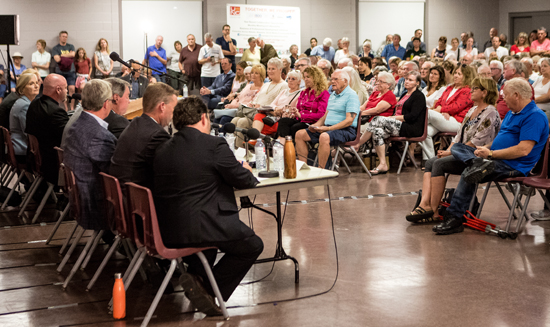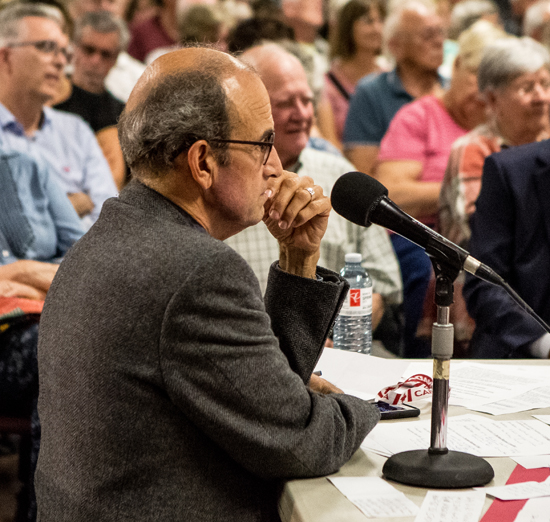
They’d just turned off the lights and cameras. The Rogers on-air microphones had gone silent. I’d finished my wrap-up of the second candidates’ forum over at the Uxbridge arena on Monday night. But we still had people standing in line at the floor mike eager to pose a few last questions. Then, with the broadcast done, a woman stepped to the mike and began to describe an eye-sore – a grain elevator – in her part of town. I wanted her to bring her concern to a question for the candidates, so I butted in.
“And the problem?” I said, expecting her to pose a question to one of the mayoral or councillor candidates.
“You’re the problem,” she said.

“How is that?” I asked.
“Because last week, when the same issue came up, you said it was a Ward 1 problem,” she said. “It’s not a Ward 1 problem. It’s a community-wide problem!”
It’s true. Too often, over the past few months of covering current affairs on the air, in the papers, online and even in public discourse, we – in the media and elsewhere – seem to have lost our way. Or, more correctly, perhaps we’ve missed the point. Whether the issue was international trade talks, sexual harassment in the workplace, nuclear weapons, pipelines, collusion or an eye-sore in this woman’s neighbourhood, somehow we’ve felt compelled to condense everything to 10-second bite on TV, a one paragraph brief in the newspaper or a presidential tweet on Twitter. And too often they fall short.
Take for example this past weekend. With winds and rain battering and flooding coastal communities in the Carolinas, last Thursday and Friday, the Cable News Network folks and the White House got into another rumble over news coverage and the president’s reputation. During the storm, CNN’s Anderson Cooper left the confines of his New York City studio and travelled south to the cover Hurricane Florence first-hand. At one point, a report showed Cooper up to his waist in water in a Carolina community, he said, “to illustrate how deep the flooding was.”
In response, Donald Trump Jr. quipped, “It’s a shame that CNN’s ratings are down 41 per cent. What’s worse is there’s a simple solution that they refuse to accept. Stop lying to try to make (President) Donald Trump look bad.” Another Trump supporter claimed that Cooper was actually down on his knees to make the water look deeper than it really was. Hang on a minute!
Have we lost perspective here? Have the media and its critics overlooked the fact that 32 people died in this storm? That floodwater has submerged or carried away thousands of people’s homes? Or that rivers and lakes are still overflowing their banks and sucking the waste from livestock farms and landfill sites into ground water and community water plants? It’s the proverbial can’t-see-the-forest-for-the-trees scenario.
Then, there’s the recent re-emergence of Jian Ghomeshi with his essay “Reflections from a Hashtag,” in the New York Review of Books. It’s now about four years since he was last in the public eye when 24 women accused him of sexual harassment, followed by an explosive court case and, in March 2016, his acquittal on four counts of sexual assault and one count of choking involving three complainants.
Anne Kingston in Maclean’s magazine quotes Ghomeshi’s essay in which he suggests he deserves credit: “One of my female friends quips that I should get some kind of public recognition as a MeToo pioneer,” he wrote. “There are lots of guys more hated than me now But I was the guy everyone hated first.”
We in the media seem obsessed with getting to these guys – whether Harvey Weinstein, Bill O’Reilly at Fox News, Les Moonves at CBS, or Jian Ghomeshi at CBC Radio – to discover their mental state, their rear-view mirror impressions and whether they feel any sense of remorse.
Has anybody thought to interview or publish essays from their alleged victims? Have we moved the discussion of respect, consent and violence against women past the front pages of tabloid news or YouTube? Where is the evidence that corporations, government departments and entertainment houses of power have begun to root out the problem, not just sensationalize it?
Oddly, one of the problems I had with the candidates’ forum last Monday night, was what the media coverage did to the format of the discussion. At one point, late in the Q-and-A session, one of the Rogers crew handed me a note. They wanted me to bring the meeting to a conclusion for the broadcast. No matter that there were still half a dozen people waiting to ask questions of the candidates. Of course, one of them was the woman who called me out on the Ward 1 eye-sore issue. In the interest of time, I had hurried the issue to a conclusion, not hurried to find the answer.
We need to do better, go further.